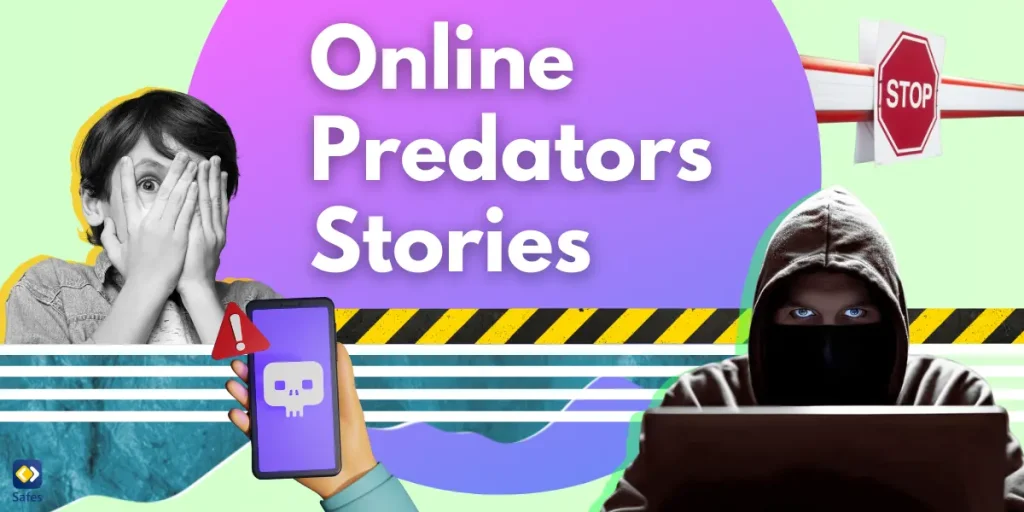Recently, you might have heard your teen mention someone being a “sigma” or talk about “sigma males” — and no, it’s not just internet gibberish. The term “sigma” has become popular in online spaces, especially among Gen Z, to describe a specific type of personality.
Download and Start Your Free Trial of the Safes Parental Control App
In slang, “sigma” refers to someone who is independent, self-reliant, and doesn’t follow the crowd. It’s often used to describe a person — usually a guy — who doesn’t seek validation from others, marches to the beat of their own drum, and seems confident without needing to be the center of attention. Think of it as the opposite of an “alpha male,” who is seen as a dominant leader. A sigma is more of a lone wolf — confident and capable, but quiet and mysterious.
How It’s Used in Real Digital Interactions
The slang term “sigma” shows up all over where teens hang out online — from TikTok and Instagram to group chats, Snapchat, and gaming lobbies. It can be used seriously or totally sarcastically, depending on the context.
Texts and Chat Messages
The meaning of “sigma” in texting or private chats (like Snapchat, WhatsApp, or Discord), is often a casual label or inside joke between friends.
- Playful/Joking:
“Bro skipped lunch to study—real sigma move.”
(They’re jokingly praising a friend for being ultra-disciplined.) - Sarcastic:
“Oh wow, you ignored her texts? Sigma energy, huh?”
(Used with an eye-roll tone, mocking someone acting cold or aloof.) - Serious/Admiring:
“He just does his thing, doesn’t care what anyone thinks. Total sigma.”
(Used to describe someone viewed as cool and self-assured.)
On TikTok
TikTok is the main platform where “sigma” has really taken off. Videos labeled with hashtags like #SigmaMale or #SigmaMindset often feature:
- Dramatic edits of quiet, confident characters (like John Wick or Peaky Blinders’ Thomas Shelby).
- Voiceovers with deep, motivational quotes.
- Parodies or memes poking fun at how overly serious some “sigma” content is.
Tone: Both serious and ironic. Many teens post exaggerated “sigma” content just for laughs.
In Gaming Chats or Discord Servers
In multiplayer games or Discord servers, “sigma” is sometimes used to tease a player who is doing things solo or ignoring group advice:
- “He went solo again, didn’t even ping us. Sigma grindset.”
(A mix of admiration and annoyance. Grindset = grinding + mindset)
Tone: Usually sarcastic or teasing, sometimes used to show respect for someone who’s good at the game and doesn’t rely on others.
On Instagram and Snapchat
Here, “sigma” tends to show up in captions, memes, or stories. A teen might post a black-and-white selfie with the caption “#SigmaEnergy” or reshare a meme about being emotionally distant.
Tone: Mostly for aesthetics or humor, less serious than on TikTok.
Bottom line? While “sigma” can carry serious or aspirational meaning, most teens use it in a light-hearted or sarcastic way. Understanding the tone behind it often depends on the context and platform.

Risk Level Indicator (Parent Alert System)
🟡 Yellow – Context matters; can be misused.
“Sigma” is mostly harmless and often used playfully or sarcastically among teens. However, context really matters. While many kids use it jokingly to describe independence or confidence, some online spaces (especially certain corners of TikTok or YouTube) take the idea more seriously and tie it to rigid or unhealthy ideas about masculinity — like glorifying emotional detachment, dominance, or ignoring others’ feelings.
These extreme interpretations aren’t the norm for most teens, but they do exist. That’s why it’s good for parents to stay curious and talk with their kids about how they interpret terms like “sigma.” Used in a healthy way, it’s just another internet label — but like a lot of slang, it can shift depending on who’s using it and why.
Trend Tracker: Is It Still Relevant?
As of April 2025, the slang term “sigma” is:
📉 Fading (was big, but is declining)
Throughout 2024, “sigma” gained significant popularity among Gen Z and Gen Alpha, often used to describe individuals who are independent and self-reliant, akin to a “lone wolf” persona. However, recent trends indicate that its usage is on the decline. While it remains recognizable, many teens have moved on to newer slang terms, reflecting the ever-evolving nature of youth language.
Mini Case Study: How “Sigma” Went Viral
Back in late 2024, a catchy Russian song called “Sigma Sigma Boy” started making waves on TikTok. Created by two young artists, Betsy and Maria Yankovskaya, the song blends pop and electronic beats while repeatedly referencing the internet slang term “sigma male”.
The song’s energetic vibe and the “sigma male” concept—a self-reliant, independent individual who doesn’t follow societal norms—resonated with many TikTok users. One of the earliest viral videos was posted on November 21, 2024, by user @sigmaboyth, featuring the song played through a speaker on a train, accompanied by humorous antics. This video quickly went viral, amassing over 36.7 million views and 3.2 million likes.
From there, TikTokers embraced the song’s energetic vibe, using snippets to create what’s often referred to as “brain rot content”—videos that are absurd, fast-paced, and purely entertaining. The trend became a staple in fan edits, featuring everything from gaming characters to TV show montages.
While the term “sigma male” has been associated with certain online communities promoting rigid or unhealthy ideas about masculinity, the TikTok trend largely adopted a humorous and ironic tone. Teens used the term playfully, often to mock or parody the very concept it represents.
Online Safety Considerations
Most of the time, when teens use the word “sigma,” it’s lighthearted and just part of online humor. However, like many internet slang terms, it can take a darker turn depending on the context.
Is “Sigma” Linked to Any Concerning Online Behaviors?
While “sigma” on its own isn’t a red flag, it sometimes appears in content tied to toxic masculinity, misogynistic beliefs, or “red pill” communities — online spaces that promote harmful ideas about gender roles. These aren’t the norm, but they do exist on platforms like YouTube, Reddit, and even TikTok.
In rare cases, influencers or accounts might use “sigma” messaging to draw teens into more extreme content, using motivation-style videos or “alpha vs. sigma” comparisons as a gateway.
Quick Advice for Parents
- Start the conversation. Ask your child casually what they think “sigma” means. You don’t need to lecture—just show genuine curiosity.
- Stay calm and open. Teens are more likely to share if they don’t feel judged. Ask, “Is this more of a joke among your friends, or do people actually take it seriously?”
- Check the content they’re consuming. Look at the types of videos or memes they’re watching. If they follow creators who push aggressive or exclusionary messages, it might be worth digging a little deeper.
- Keep an eye on tone. If your teen starts saying things like “emotions are weak” or “being cold is powerful,” it could be a sign they’re buying into the more toxic interpretations.

Parental Controls & Tools
While open conversations are the most powerful way to stay connected with your child’s digital world, a few tech tools can help you guide their online experience more safely. Here are some options:
Android Parental Controls
If your child uses an Android phone or tablet, using the Android built-in parental controls is a free option:
- Set screen time limits per app
- See which apps your child uses
- Block or approve app downloads
- Filter mature content in Google Search and YouTube
- Track your child’s location
How to set it up: Download Google Family Link from the Play Store on both your phone and your child’s device.
iPhone Parental Controls (Screen Time Settings)
Apple offers built-in parental controls with Screen Time, available on iPhones and iPads:
- Set time limits for apps or categories (like social media or games)
- Restrict access to explicit content in Safari, iTunes, and the App Store
- Block certain websites or filter adult content
- Prevent in-app purchases or app installs
How to set it up: Go to Settings > Screen Time > Set Up as Parent and follow the steps.
Safes Parental Control App
Safes Parental Control App is an easy-to-use solution for both Android and iPhone devices. With Safes, you can:
- Monitor screen time, app usage, and browsing activity
- Block inappropriate content, including websites and apps
- Set up alerts for risky behavior such as explicit content
- Set daily screen time limits to encourage balanced device use
It’s a user-friendly app that allows you to ensure your child is safe online while still having the freedom to explore and learn.
Tip: Parental controls aren’t about spying—they’re about setting healthy boundaries. They work best when paired with regular, respectful conversations about what your child is seeing, doing, and feeling online.
Conclusion: Understanding Sigma in Slang
“Sigma” has become a popular term among teens, especially in places like TikTok, Instagram, and gaming chats. It typically describes someone who is independent, confident, and a bit of a “lone wolf,” but it can be used in both playful and serious ways.
While most teens use it for fun or as an inside joke, it’s important to be aware that in some online spaces, the term may be tied to more rigid or unhealthy ideas about masculinity.
For parents, the key is to stay engaged and have open conversations with your child about what “sigma” means to them. Understanding the term and its context helps guide their online experiences and ensures they’re using it in a healthy way.
Your Child’s Online Safety Starts Here
Every parent today needs a solution to manage screen time and keep their child safe online.
Without the right tools, digital risks and excessive screen time can impact children's well-being. Safes helps parents set healthy boundaries, monitor activity, and protect kids from online dangers—all with an easy-to-use app.
Take control of your child’s digital world. Learn more about Safes or download the app to start your free trial today!




